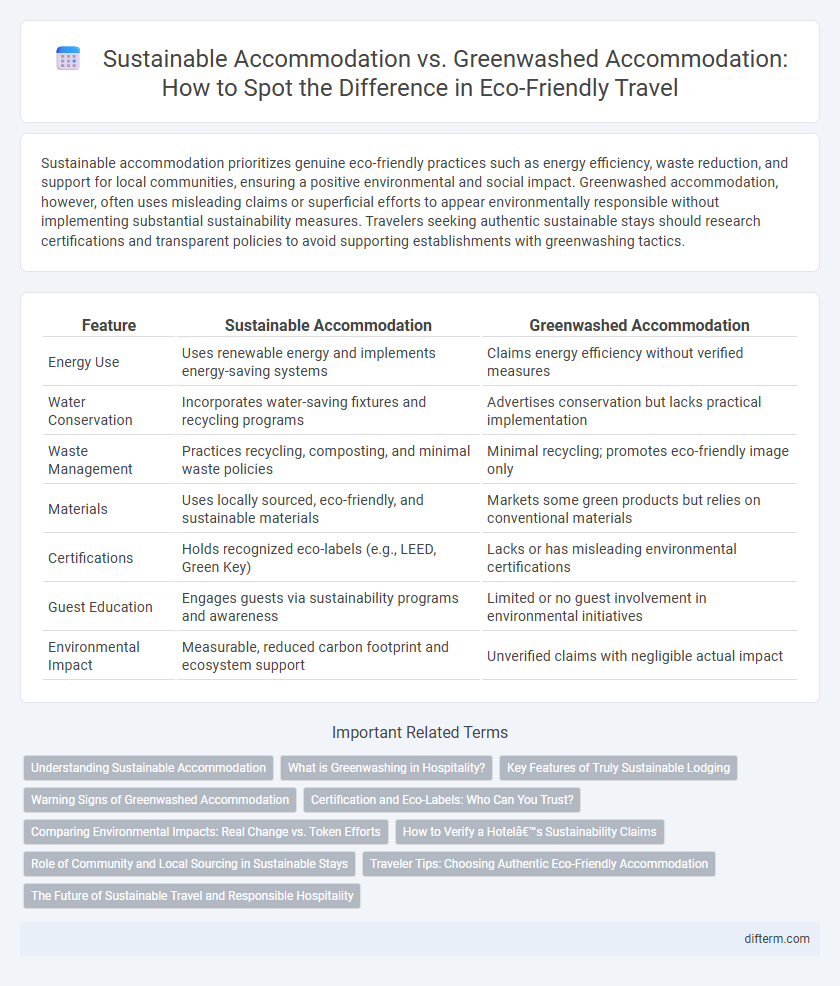Sustainable accommodation prioritizes genuine eco-friendly practices such as energy efficiency, waste reduction, and support for local communities, ensuring a positive environmental and social impact. Greenwashed accommodation, however, often uses misleading claims or superficial efforts to appear environmentally responsible without implementing substantial sustainability measures. Travelers seeking authentic sustainable stays should research certifications and transparent policies to avoid supporting establishments with greenwashing tactics.
Table of Comparison
| Feature | Sustainable Accommodation | Greenwashed Accommodation |
|---|---|---|
| Energy Use | Uses renewable energy and implements energy-saving systems | Claims energy efficiency without verified measures |
| Water Conservation | Incorporates water-saving fixtures and recycling programs | Advertises conservation but lacks practical implementation |
| Waste Management | Practices recycling, composting, and minimal waste policies | Minimal recycling; promotes eco-friendly image only |
| Materials | Uses locally sourced, eco-friendly, and sustainable materials | Markets some green products but relies on conventional materials |
| Certifications | Holds recognized eco-labels (e.g., LEED, Green Key) | Lacks or has misleading environmental certifications |
| Guest Education | Engages guests via sustainability programs and awareness | Limited or no guest involvement in environmental initiatives |
| Environmental Impact | Measurable, reduced carbon footprint and ecosystem support | Unverified claims with negligible actual impact |
Understanding Sustainable Accommodation
Sustainable accommodation minimizes environmental impact through energy efficiency, water conservation, waste reduction, and support for local communities, ensuring authentic eco-friendly practices. Certifications like LEED, Green Key, and EarthCheck help verify genuine sustainability efforts, distinguishing them from greenwashed accommodations that falsely claim eco-friendly standards. Travelers seeking responsible stays should prioritize verified sustainable certifications to promote environmental stewardship and social responsibility in the tourism industry.
What is Greenwashing in Hospitality?
Greenwashing in hospitality occurs when accommodations falsely market themselves as environmentally friendly without implementing genuine sustainable practices, misleading travelers seeking eco-friendly options. This deceptive approach often involves superficial claims, such as using green branding or minimal recycling efforts, without reducing overall environmental impact. Recognizing authentic sustainable accommodation requires scrutinizing certifications, transparent policies, and measurable environmental initiatives beyond marketing rhetoric.
Key Features of Truly Sustainable Lodging
Truly sustainable lodging prioritizes energy efficiency, waste reduction, water conservation, and support for local communities, often verified by recognized eco-certifications such as LEED or Green Key. These accommodations use renewable energy sources, implement comprehensive recycling programs, and source food and materials locally to minimize environmental impact. Genuine transparency in sustainability practices and continuous improvement efforts distinguish truly sustainable lodging from greenwashed counterparts that merely use misleading marketing without substantial eco-friendly actions.
Warning Signs of Greenwashed Accommodation
Look for certifications from recognized organizations like LEED or Green Key to identify truly sustainable accommodation, as many properties falsely claim eco-friendliness without verifiable standards. Warning signs of greenwashed accommodation include vague sustainability claims, lack of transparent environmental policies, and exaggerated use of eco-friendly language without concrete evidence. Authentic sustainable lodgings often provide detailed information on energy-saving measures, waste reduction programs, and local community support, distinguishing them from greenwashed competitors.
Certification and Eco-Labels: Who Can You Trust?
Certified sustainable accommodations adhere to rigorous standards set by recognized organizations such as Green Key, LEED, and EarthCheck, ensuring genuine eco-friendly practices like energy efficiency, waste reduction, and community support. In contrast, greenwashed accommodations often misuse or exaggerate eco-labels without third-party verification, misleading travelers about their environmental impact. Trustworthy certifications provide transparent audits and ongoing compliance, making them reliable indicators for eco-conscious travelers seeking authentic sustainable stays.
Comparing Environmental Impacts: Real Change vs. Token Efforts
Sustainable accommodation integrates energy-efficient systems, water conservation, and waste reduction to minimize ecological footprints, often verified by credible certifications like LEED or Green Key. Greenwashed accommodations superficially claim eco-friendliness through marketing without implementing substantial environmental practices, leading to negligible or no real impact. Genuine sustainable lodging promotes biodiversity protection, community engagement, and long-term resource management, whereas greenwashing misleads travelers and undermines authentic conservation efforts.
How to Verify a Hotel’s Sustainability Claims
Check for third-party certifications such as LEED, Green Key, or EarthCheck to verify a hotel's sustainability claims, ensuring they meet rigorous environmental standards. Review transparent reporting on energy efficiency, water conservation, waste management, and community impact practices published by the hotel. Cross-reference guest reviews and independent travel blogs for authentic experiences highlighting genuine sustainable initiatives versus superficial greenwashing.
Role of Community and Local Sourcing in Sustainable Stays
Sustainable accommodation actively engages the local community by sourcing materials, food, and services locally, thereby supporting economic growth and preserving cultural heritage. Greenwashed accommodations often claim eco-friendliness but lack genuine partnerships with local stakeholders, leading to shallow environmental and social impacts. Authentic sustainable stays prioritize transparency and collaboration with local artisans, farmers, and businesses to create meaningful benefits for both guests and host communities.
Traveler Tips: Choosing Authentic Eco-Friendly Accommodation
Travelers seeking authentic eco-friendly accommodation should prioritize certifications such as LEED, Green Globe, or EarthCheck to ensure genuine sustainability practices. Researching guest reviews for transparency and verifying energy efficiency, waste reduction, and water conservation efforts can help avoid greenwashed establishments. Opting for accommodations that actively support local communities and biodiversity demonstrates a commitment to true environmental responsibility.
The Future of Sustainable Travel and Responsible Hospitality
Sustainable accommodation prioritizes eco-friendly practices such as energy efficiency, waste reduction, and local community support, fostering genuine environmental and social impact. Greenwashed accommodation, in contrast, often exaggerates or falsifies sustainability claims to attract eco-conscious travelers without implementing meaningful changes. The future of sustainable travel hinges on transparent certification, responsible hospitality, and consumer awareness to promote authentic green lodging that benefits both the planet and local economies.
Sustainable Accommodation vs Greenwashed Accommodation Infographic

 difterm.com
difterm.com